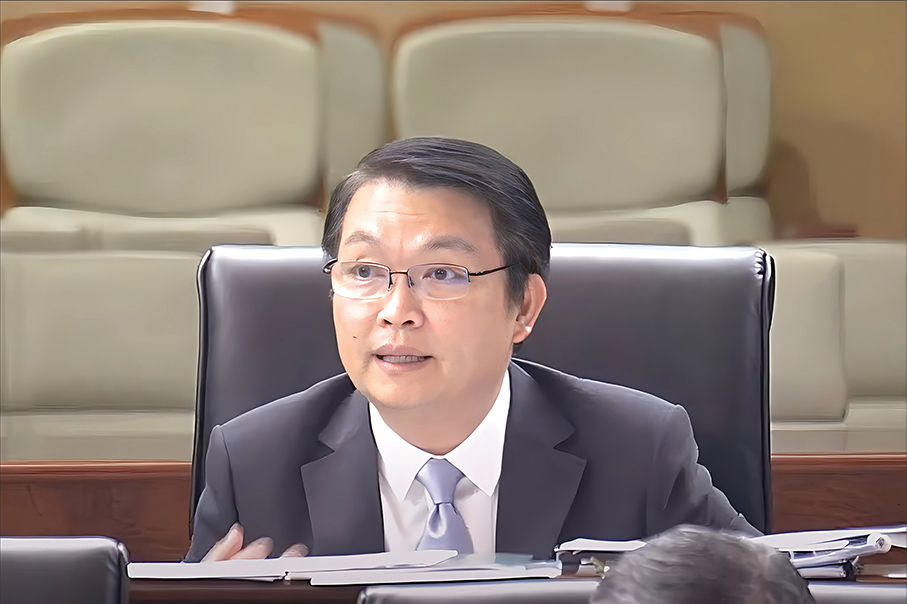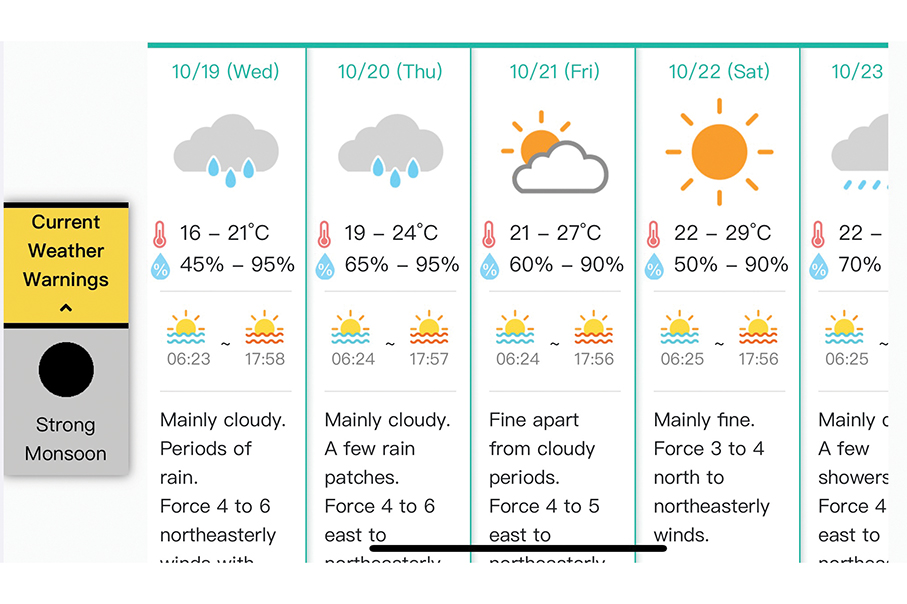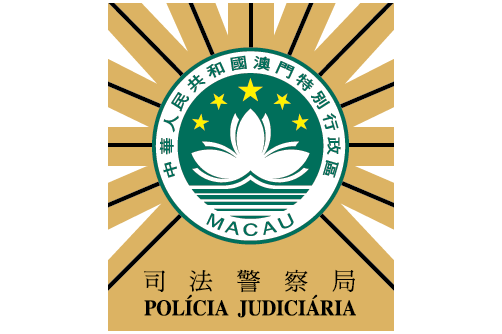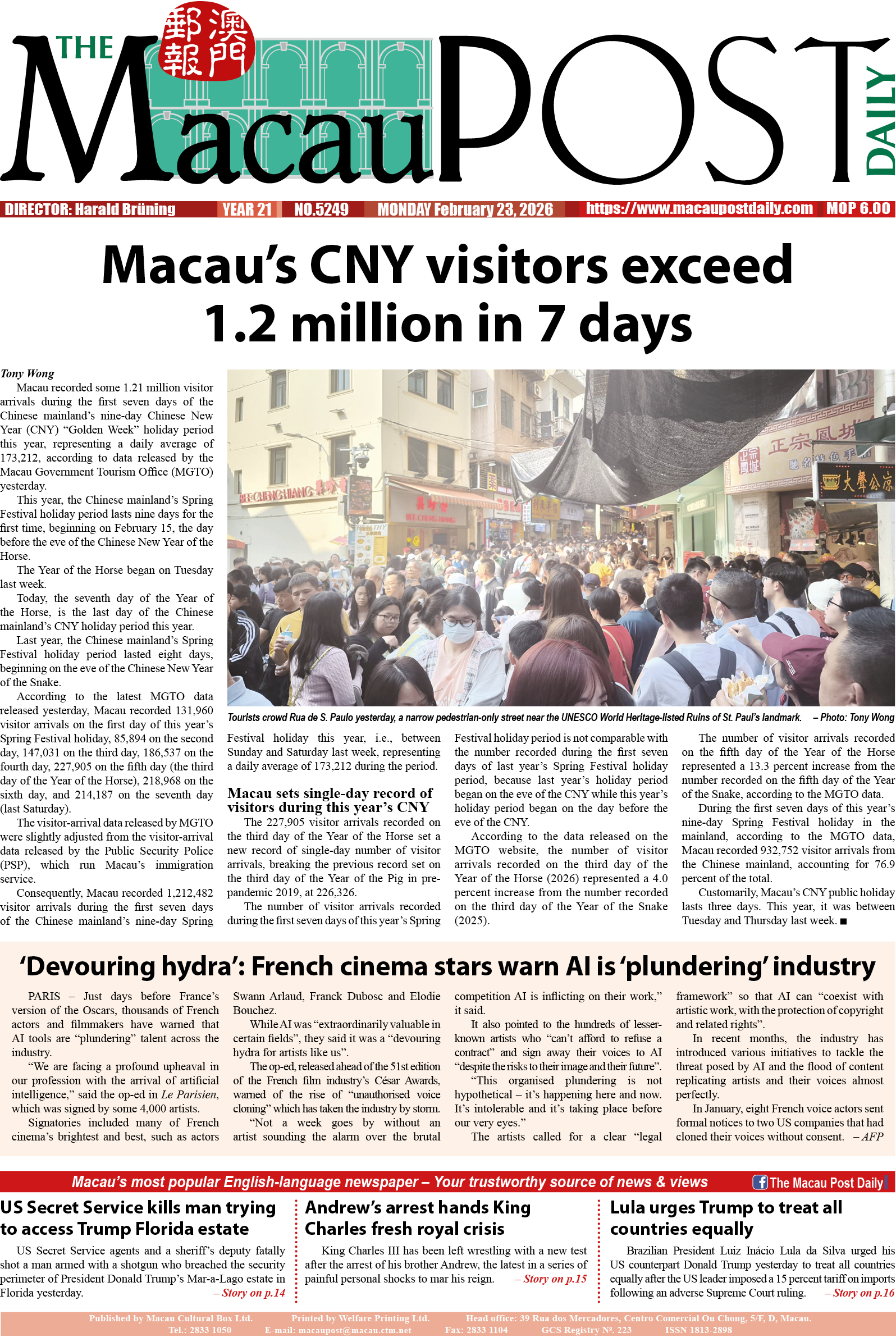Govt to spend nearly 30 pct of total expenses on welfare next year
Secretary for Economy and Finance Lei Wai Nong pledged yesterday that the government will make better use of the role of its public finances’ “secondary distribution” with the aim of boosting the development of new key industries, creating a better business environment, and raising local employees’ competitiveness, apart from continuing with its various welfare measures aiming to promote the well-being of different population segments.
The policy secretary also underlined that nearly 30 percent of the government’s budgeted total expenditure next year would be used on its various welfare measures as well as tax deductions and exemptions.
According to various specialist websites, secondary distribution refers to the government’s redistribution of the population’s income and wealth through various channels such as taxation, social transfers and the provision of public services.
In the concept of redistribution of income and wealth comprising three domains, according to the website of East Asia Forum – an analysis and research platform for various social-science topics, primary distribution refers to the market mechanism’s income distribution among capital owners, labour, and the government, while secondary distribution refers to government-led redistribution of primary income. Tertiary distribution engages with civil society through philanthropy and social responsibility, normally based on a voluntary basis.
Lei made the remarks during yesterday’s one-day Q&A session in the Legislative Assembly’s (AL) hemicycle about his portfolio’s policy guidelines for next year.
Lei underlined that the local government’s secondary distribution has constantly been putting strong emphasis on promoting residents’ well-being, according to which the government will continue to allocate its financial resources to senior citizens, students, and low-income households, as well as measures supporting the development of local small- and medium-sized enterprises (SMEs). In addition, the government will continue with its various tax deductions and exemptions, Lei said.
The government will continue to allocate a “certain percentage” of its financial resources to its investment in public construction projects as well as promoting the city’s appropriate economic diversification.
Lei said that the government’s spending on its various welfare measures as well as tax deductions and exemptions would account for nearly 30 percent of its next year’s budgeted total expenditure.
Lei pledged that the government will “make more effective use of the adjusting role” of its secondary distribution, according to which the government will roll out various favourable measures supporting the development of new key industries and the necessary human resources, creating a better business environment, and encouraging local employees to raise their competitiveness.
Expansion of international visitor sources
Meanwhile, Lei said that the government will roll out special new programmes aiming to expand international visitor sources next year, when it will first put special emphasis on the markets in Southeast Asian and Northeast Asian countries, aiming to expand Macau’s air passenger routes to more destinations in the two regions.
The government will launch new promotion discount offers for air tickets, hotel stays, dining and other entertainment events next year, Lei said.
Lei underlined that the tourism and leisure sector is Macau’s advantageous industry, adding that diversifying visitor sources would help “safeguard the dynamics” for the city’s economic growth.
Macau Government Tourism Office (MGTO) Director Maria Helena de Senna Fernandes said that research findings released earlier this year indicate that Macau is one of the top destinations for tourists from Southeast Asian and Northeast Asian countries. In addition, she said, Macau’s international air passenger flights cover “quite a few” destinations in those two regions.
Consequently, the tourism chief said it would be easier to increase the number of international visitor arrivals in a shorter time by focusing on the two regions first. She underlined that the development of visitor source markets from the two regions would be able to help Macau expand its visitor sources from foreign countries in other regions.
Senna Fernandes also underlined that Macau’s number of foreign visitor arrivals has been steadily recovering since early this year. According to official data, Macau only recorded a daily average of around 1,000 foreign visitor arrivals in January, equivalent to only 10 percent of the one recorded in the same period of pre-COVID-19 pandemic 2019, while the daily average of foreign visitor arrivals increased to around 5,200 last month, representing 75 percent of the one recorded in October 2019, she said.
Lei said that, on average, visitors to Macau are getting “younger and younger”, adding that currently around 80 percent of overnight visitors stay in hotels.
According to official statistics, overnight visitors accounted for 47.3 percent of the total number of visitor arrivals last month. Same-day visitors made up the majority of visitor arrivals in October.
Meanwhile, Lei also underlined that the government’s ongoing appropriate economic diversification drive should be carried out in line with the principle that the development of the respective industries should be mainly driven by market forces with the government merely playing a role in guiding the direction of their developments.
Lei also reaffirmed that the local government is now “more confident than ever before” in achieving the city’s appropriate economic diversification.
Casinos’ mass-market segment
Meanwhile, Lei also underlined that the government “cannot require” the city’s gaming operators to raise their workers’ salaries, but he was quick to note that the government has “repeatedly” urged profitable companies to raise their employees’ salaries. Lei said that in line with a previous survey Macau’s private sector employees could expect salary hikes ranging between 2 and 3 percent.
Lei also reaffirmed that the government is confident that next year’s gross gaming revenue (GGR) would reach 216 billion patacas forecast by its 2024 budget bill, which is being reviewed by one of the legislature’s standing committees.
The policy secretary also revealed that the mass-market segment of the city’s casinos currently generates around 75 percent of gaming revenues, with the VIP segment accounting for the remaining 25 percent, a change from the past when the mass market and VIP market made up 40 percent and 60 percent respectively.
Macau’s six integrated resort operators currently own 30 casinos.
Meanwhile, Lei also said that the local government’s financial reserves currently stand at 568 billion patacas, adding that its foreign exchange reserves amount to around 210 billion patacas.
The policy secretary said he was confident that the return rate of the government’s investment from its financial reserves this year would surpass the local inflation rate.
According to official statistics, Macau’s consumer price index (CPI) grew by 0.84 percent in the first nine months of this year.

Secretary for Economy and Finance addresses yesterday’s Q&A session about his portfolio’s 2024 policy guidelines in the Legislative Assembly’s (AL) hemicycle.
– Photo: GCS








